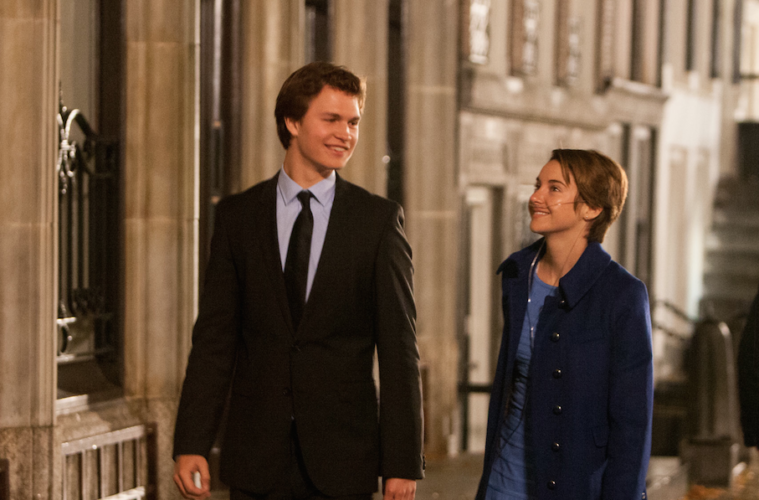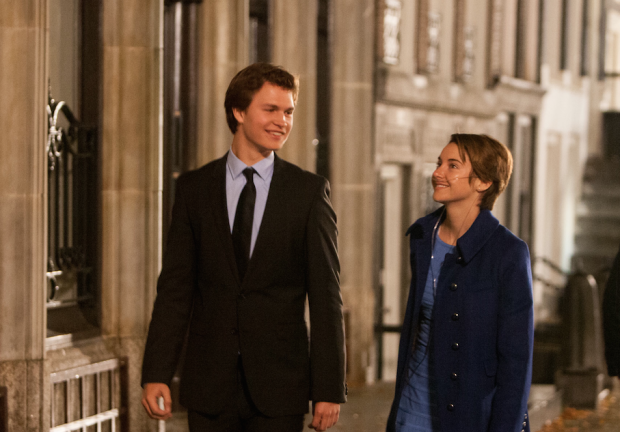
The Fault in Our Stars has a loyal following already, and if all the excellent marketing and momentum it is currently carrying pans out, the film should be a commercial success when it releases this weekend. But more than anything, it’s also a quality film that doesn’t hide the truth about death and dying and how much you can’t shy away from living life when those are always inevitable. Author John Green has created enduring characters and Shailene Woodley, Ansel Elgort, and Nat Wolff bring them to vivid life in the drama directed by Josh Boone.
I recently had the chance to sit down with Green, Woodley, and Wolff to talk about the film and how they felt about the idea of losing mobility or a limb, the difficulty with shooting for coverage for a length of time and then having a camera pointed at you and having to ramp up emotionally again, why they all want John on every set from now on, and much more. Read the full conversation below.
The Film Stage: As someone who leads an active life, your film has a character whose prior life kind of revolved around being physically active. He was a star basketball player and he has his leg amputated. When crafting the story, did you put yourself into that scenario and what examples did you use?
John Green: I have a good friend, Josh Sundquist, who is an amputee and osteosarcoma survivor. He has a great YouTube channel and I’ve known him for a long time. You just find ways to be active.
Shailene Woodley: You adapt.
Green: Yeah, you adapt. You find ways to incorporate your disability into your life. It’s the same way that people incorporate minor disabilities into their life. Like visual impairment or whatever. I think it can be more challenging, obviously, but that’s what you have to try to do. As a writer, I think sometimes if I lost my arms it would be very difficult. Typing is such an important part of how I write. It’s a physical activity for me. To move my fingers over the keys. I care about what’s called “key action” in the world of keyboards. The process of the pressing of the key and how it sounds and feels. I would lose that and that would be very difficult for me. I don’t want to minimize that loss. But I would have to find a way to integrate that into my life so that I could still tell stories because that would not stop being important to me.
And both of your characters, Shailene, you have trouble breathing, and Nat, you have issues with your eyesight throughout. But you both prove that life just keeps going. You just move through.
Woodley: We were kind of built to survive. We’re built to adapt as a species. You look at humans and you see that. If you look at a lizard, it’s tail gets cut off and it grows another one. There’s two-legged dogs and three-legged dogs and they keep running. It’s part of that primal instinct to keep going. You adapt to whatever circumstances you have. I have scoliosis which is pretty crazy. My spine is a fancy little S… for my name.
[All laugh]
Woodley: And you just adapt to it. You learn how to sit differently and you learn how to move your legs differently so your body is more aligned.
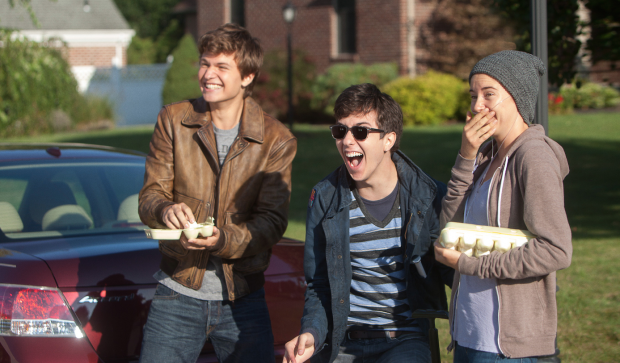
This film deals with some heavy material. Shailene, your character has some really emotional scenes and I’m curious how hard it is to keep that kind of emotion going. There’s got to be a point where you just simply can’t cry anymore, right?
Green: She doesn’t.
Woodley: [Laughs] I do! For me, the hardest thing about emotional scenes is not doing them. It’s doing them when the camera is not on me. Like, right now, there’s a camera on you and there’s a camera on us. It’s all being captured, these moments. When you do a movie, we’re going to film you and then we’re going to turn around and film us. But you’ve got to do the same exact thing that you did during your coverage so we can react the same way. And I’ve worked with actors that don’t do that. They’ll do something completely different when you’re on camera and it doesn’t line up and it doesn’t match and it’s kind of a jerky thing to do. So for me it’s hard to get back into it. It takes like an hour for the cameras to turn around. So I can cry for seven hours straight, but then as soon as you take an hour break, and have to get back into it, your body’s like, “Well, I’m done with that.”
Green: Yeah, and if you don’t, and someone is doing the coverage and they’re like, “Oh, Hazel, I’m so sad.” You’d just be like, “That’s not helping me.”
Woodley: Exactly!
Nat Wolff: I’ve had the opposite happen where I’d give my all off camera and once it got to me I was just like, [Pauses, makes stern face], “FUCK!”
[Everyone laughs]
So, John, you were on set quite a bit but how much did you interact with the screenwriters?
Green: Yeah, they wrote the draft and it was really good so there wasn’t much interaction to be had except for me to say, “This is really good.” I sent like a list of 40 little annoying things, like, “There should be a comma here.” I liked the script a lot. I thought the ending of the script was better than my book. It made me mad in that sense. But it’s not my movie. I didn’t want it to be my movie. I don’t know how to make a movie. I also think that when a book is finished it belongs to readers. I had to let Isaac belong to Nat. I had to let Hazel belong to Shae. If I was trying to hold on desperately, trying to cling to Isaac and Hazel, they couldn’t have made those characters their own. They couldn’t have brought life to those characters because I would have been dragging them down, trying to keep them from having control of those people. The book was finished and it was their’s now and I’m so grateful that I was able to do that because they brought things to those characters that I could never have found. I feel really lucky. I’m on the press tour, by the way, because I like the movie. Believe you, me, if I didn’t like the movie I’d be home with my kids.
For Nat and Shailene, how much did you seek out this writer of the novel and how much did you try to keep it focused on the script?
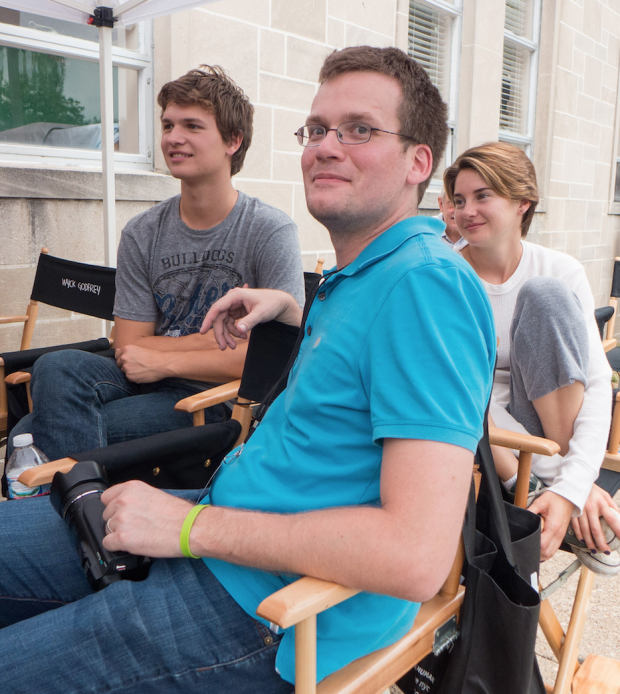 Woodley: I tried to do everything that was written on the script because the script was pretty perfect. It was a pretty exact adaptation of the book. But having John there, the movie wouldn’t be what it is without John. Almost every single day there were times when the director [Josh Boone] would go to John and ask him a question. Or the producers would go to John to ask him a question. Or I would or you, Nat. And it wasn’t always to necessarily ask a question but it was more like, “Was that okay?”
Woodley: I tried to do everything that was written on the script because the script was pretty perfect. It was a pretty exact adaptation of the book. But having John there, the movie wouldn’t be what it is without John. Almost every single day there were times when the director [Josh Boone] would go to John and ask him a question. Or the producers would go to John to ask him a question. Or I would or you, Nat. And it wasn’t always to necessarily ask a question but it was more like, “Was that okay?”
Green: And then through my tears I would say, “Yes.” [Laughs]
Woodley: Sometimes you wouldn’t even need to say anything. It was just a look. And then there’d be other times when something wouldn’t be working and we’d be struggling to figure it out logistically and to have you there was amazing to be able to ask, “What do you think?” And you’d be so good at saying, “Well, it’s not my movie, but this is how I had always envisioned that.” By him saying that it gave us a better understanding on how to approach something.
Green: Nat, what was it like having me on set?
Wolff: Well, first of all, we had a lot of John just through the book, obviously, that wasn’t in the script. But I think there’s also parts, because he wrote all the characters, of himself in all the characters. Through hanging out with him we all found those little parts. Ansel [Elgort] has talked a lot about that being the key to his character and I remember thinking about how John is so smart and these characters are so smart. A lot of that was kind of from just hanging out with him and taking those little things. Also, it was great just to have encouragement. I love it. If I’m acting and someone is invested with me, and they’re watching while crying or laughing, it makes me feel like there’s a purpose to what I’m doing.
Green: Yeah, everybody on a movie set has to work so hard. They have jobs and they have to do incredibly difficult work and you have to be very focused and concentrated and efficient. And I did not have a job. And that was great because I think there should be a guy that has my job on every movie set who is just excited.
Wolff: Hype man!
Green: Hype man, yeah! All of this was super stressful and I know you guys are all working really hard, but let’s just pause for one second.
Wolff: I want to bring John to every set.
Woodley: Yes!
Green: We’re making a movie! This is so cool!
Wolff: It would be so fun if you just went to a ton of sets.
Green: That should be my new job.
Woodley: Because you can write during the downtime.
Green: Totally. Just look up from my writing every few hours and be like, “This is awesome, huh!? How bout this?”
Wolff: John has to go. He’s got the next Avengers movie to go to.
[Everyone laughs]
Woodley: Will you cast me?
Green: Will I?
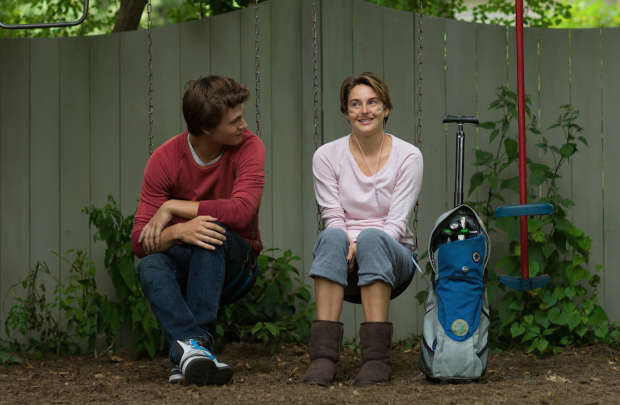
The Fault in Our Stars hits theaters on Friday, June 6th.

